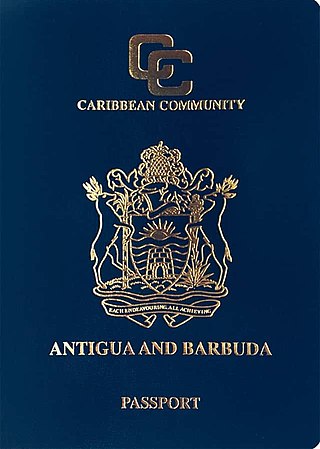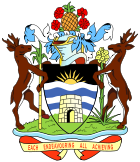
Antigua and Barbuda is a sovereign island country in the Caribbean. It lies at the conjuncture of the Caribbean Sea and the Atlantic Ocean in the Leeward Islands part of the Lesser Antilles.

The politics of Antigua and Barbuda takes place in a framework of a unitary parliamentary representative democratic monarchy, wherein the sovereign of Antigua and Barbuda is the head of state, appointing a governor-general to act as vice-regal representative in the nation. A prime minister is appointed by the governor-general as the head of government, and of a multi-party system; the prime minister advises the governor-general on the appointment of a Council of Ministers. Executive power is exercised by the government. Legislative power is vested in both the government and the two chambers of the Parliament. The bicameral Parliament consists of the Senate and the House of Representatives.

The governor-general of Antigua and Barbuda is the representative of the monarch of Antigua and Barbuda, currently King Charles III. The official residence of the governor-general is Government House.

The prime minister of Antigua and Barbuda is the head of government of the Antigua and Barbuda. The prime minister of Antigua and Barbuda is appointed by the Governor-General under the terms of the Constitution.

The Parliament of Antigua and Barbuda consists of the King of Antigua and Barbuda, the Senate and the House of Representatives.

The House of Representatives of Antigua and Barbuda is the lower chamber of the country's bicameral parliament. Each of the constituencies created in accordance with section 62 of the Constitution shall elect one representative to the House in a direct election in accordance with the procedures specified by or pursuant to any law, subject to the rules of the Constitution. Unless he is prohibited by law from registration as a voter for the purpose of electing a member of the House, every Commonwealth citizen who is eighteen years of age or older and who meets the requirements relating to residence or domicile in Antigua and Barbuda as prescribed by Parliament is entitled to be registered as such a voter in accordance with the provisions of any law in that regard, and no other person may be registered. Every person who is registered to vote in any constituency shall, unless prohibited from doing so by any law, be entitled to vote in accordance with the provisions of any law in that regard in any election of members of the House in that constituency. Voting is free and must be done by secret ballot in accordance with any rules that Parliament may impose during House member elections.

The Senate is the upper house of the Parliament of Antigua and Barbuda. The Senate and the lower chamber, the House of Representatives, together form the bicameral legislature of Antigua and Barbuda. The Senate and the House together may make laws for "the peace, order and good government of Antigua and Barbuda". Any bill other than a money bill may be introduced in the Senate.

The monarchy of Antigua and Barbuda is a system of government in which a hereditary monarch is the sovereign and head of state of Antigua and Barbuda. The current Antiguan and Barbudan monarch and head of state, since 8 September 2022, is King Charles III. As sovereign, he is the personal embodiment of the Crown of Antigua and Barbuda. Although the person of the sovereign is equally shared with 14 other independent countries within the Commonwealth of Nations, each country's monarchy is separate and legally distinct. As a result, the current monarch is officially titled King of Antigua and Barbuda and, in this capacity, he and other members of the Royal Family undertake public and private functions domestically and abroad as representatives of Antigua and Barbuda. However, the King is the only member of the Royal Family with any constitutional role.

The following outline is provided as an overview of and introduction to Antigua and Barbuda:

Antiguan and Barbudan passports are issued to nationals of Antigua and Barbuda for international travel. The passport is a CARICOM passport as Antigua and Barbuda is a member of the Caribbean Community.

The Government of Antigua and Barbuda (GOAB), is a unitary constitutional monarchy, where the Monarch of Antigua and Barbuda serves as the head of state, represented by the Governor-General of Antigua and Barbuda, and the Prime Minister of Antigua and Barbuda serves as the head of government.

The Most Exalted Order of the National Hero is an Antiguan and Barbudan order of chivalry recognising pre-eminently distinguished service to Antigua and Barbuda or to humanity at large. The present Order was established and constituted by the Parliament of Antigua and Barbuda under the National Honours Act 1998. which received Royal Assent from the Governor General of Antigua and Barbuda on 31 December 1998.

The Most Illustrious Order of Merit is an Antiguan and Barbudan order of merit recognising meritorious service to Antigua and Barbuda, the Caricom region or the international community. It was established and constituted by the Parliament of Antigua and Barbuda under the National Honours Act 1998. which received Royal Assent from the Governor General of Antigua and Barbuda on 31 December 1998.
The Barbuda Land Acts establishes that the citizens of Barbuda communally own the land. The act specifies that residents must provide consent for major development projects on the island. The Government of Antigua and Barbuda passed the act on January 17, 2008.
Antiguan and Barbudan nationality law is regulated by the 1981 Constitution of Antigua and Barbuda, the various Antigua and Barbuda Citizenship Acts, the Millennium Naturalisation Act of 2004, and various British Nationality laws. These laws determine who is, or is eligible to be, a national of Antigua and Barbuda. Antiguan and Barbudan nationality is typically obtained either on the principle of jus soli, i.e. by birth in Antigua and Barbuda; or under the rules of jus sanguinis, i.e. by birth abroad to a parent with Antiguan or Barbudan nationality. It can also be granted to persons with an affiliation to the country, by investment in the country's development, or to a permanent resident who has lived in the country for a given period of time through naturalisation. Nationality establishes one's international identity as a member of a sovereign nation. Though it is not synonymous with citizenship, rights granted under domestic law for domestic purposes, the United Kingdom, and thus the commonwealth, has traditionally used the words interchangeably.

Antigua, officially the Associated State of Antigua, was an associated state of the United Kingdom, which was established on 27 February 1967. The associated state was abolished on November 1, 1981, by the Antigua Order.
Royal tours of Antigua and Barbuda by its royal family have been taking place since the 20th century. Elizabeth II, Queen of Antigua and Barbuda, visited the country thrice: 1966, 1977, and 1985.
The Supreme Audit Institution of Antigua and Barbuda, co-officially known as the Office of the Director of Audit, is the supreme audit institution of Antigua and Barbuda, and as such, assists the Parliament in holding the government accountable in management of the country's finances and operations. The institution describes itself as "an independent, constitutionally established office that exists to serve Parliament."

The judiciary of Antigua and Barbuda is an independent branch of the Antiguan and Barbudan government, subject to the Constitution of Antigua and Barbuda. Even though the Office of the Attorney General in the executive branch appoints magistrates, the judicial branch is mostly independent of the other two branches. The Magistrate's Court handles minor offenses, while the High Court handles major ones, makes up the judiciary. A matter must be sent to the Eastern Caribbean States Supreme Court, whose members are chosen by the OECS, in order to move past the High Court. The heads of state in the OECS system must unanimously approve any appointments or removals of Supreme Court magistrates. The attorney general's advice is the basis for the prime minister of Antigua and Barbuda's decision-making on this court.

The Barbuda Local Government Act is an Act of the Parliament of Antigua and Barbuda which legislated for the establishment of the Barbuda Council. The Act is enshrined under section 123 of the Constitution and can only be amended by Parliament with the consent of the Council.








